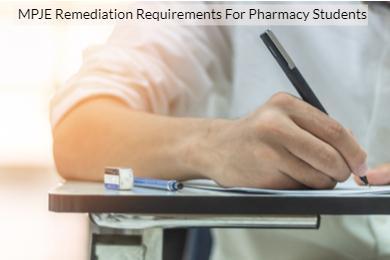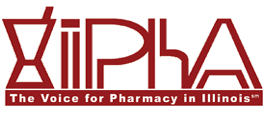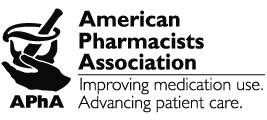Recent Blog Posts
What Pharmacy Students Need to Know About MPJE Remediation
 Pharmacists need to have detailed knowledge of a wide variety of pharmaceutical issues, as well as the practices followed in their profession and the legal issues related to the products and services they provide to patients. To ensure that a person will be able to meet all of their ongoing requirements as a pharmacist, they will need to complete examinations demonstrating their knowledge and competency. The Multistate Pharmacy Jurisprudence Examination (MPJE) is one of the two exams that students must pass, and if they fail this exam three times, they must complete certain requirements for remediation before they can retake the exam.
Pharmacists need to have detailed knowledge of a wide variety of pharmaceutical issues, as well as the practices followed in their profession and the legal issues related to the products and services they provide to patients. To ensure that a person will be able to meet all of their ongoing requirements as a pharmacist, they will need to complete examinations demonstrating their knowledge and competency. The Multistate Pharmacy Jurisprudence Examination (MPJE) is one of the two exams that students must pass, and if they fail this exam three times, they must complete certain requirements for remediation before they can retake the exam.
What Does the MPJE Cover?
The MPJE will consist of 120 questions, and a person will have 2.5 hours to complete the exam. These questions will cover:
-
Pharmacy practice (around 83 percent of the test) - Subjects addressed will include the legal responsibilities of pharmacy staff, procedures followed when acquiring and distributing pharmaceutical products, legal requirements for issuing prescriptions, proper procedures for dispensing controlled substances and other products, patient counseling requirements, requirements when distributing or dispensing non-prescription products or medications, record-keeping procedures, and requirements for handling hazardous materials.
How Can Unethical Conduct Affect a Psychologist’s Professional License?

Psychologists and therapists provide essential care for many people, helping them address issues related to mental health and working to ensure that they can maintain positive relationships with others. However, because psychologists discuss the sensitive details of people’s personal lives, they may sometimes be accused of unethical or unprofessional conduct. In these cases, a person may be investigated by the Illinois Department of Financial and Professional Regulation (IDFPR), and they may be subject to disciplinary action by the Illinois Board of Clinical Psychologists. Those who are facing discipline that could affect their professional license will want to work with an attorney to determine their best options for addressing these issues.
Forms of Unprofessional Conduct That Could Lead to License Discipline
How Can Drug Conspiracy Accusations Affect a Person’s DEA Registration?
 Medical providers who work with controlled substances are required to follow multiple laws and procedures, and they are likely to face scrutiny about their practices of prescribing and dispensing drugs. Doctors, pharmacists, and other providers are required to register with the Drug Enforcement Administration (DEA), and they must maintain this registration in order to be able to continue prescribing, administering, or dispensing controlled substances. The DEA will often investigate suspected cases of drug diversion, and in addition to pursuing criminal charges, it may suspend or revoke a provider’s controlled substance registration, which can lead to other consequences that affect their ability to continue practicing. Conspiracy to possess, dispense, or distribute a controlled substance is one offense that the DEA will be looking to address, and providers will want to be aware of the types of activities that could lead to an investigation.
Medical providers who work with controlled substances are required to follow multiple laws and procedures, and they are likely to face scrutiny about their practices of prescribing and dispensing drugs. Doctors, pharmacists, and other providers are required to register with the Drug Enforcement Administration (DEA), and they must maintain this registration in order to be able to continue prescribing, administering, or dispensing controlled substances. The DEA will often investigate suspected cases of drug diversion, and in addition to pursuing criminal charges, it may suspend or revoke a provider’s controlled substance registration, which can lead to other consequences that affect their ability to continue practicing. Conspiracy to possess, dispense, or distribute a controlled substance is one offense that the DEA will be looking to address, and providers will want to be aware of the types of activities that could lead to an investigation.
How Can I Restore My Medical License After IDFPR Disciplinary Action?
 There are multiple reasons why medical professionals may face disciplinary action. Certain types of criminal convictions, accusations of medical malpractice or unethical practices, or the loss of a DEA controlled substance registration are just a few of the many issues that may result in discipline. In these cases, the Illinois Medical Board, the Illinois Board of Nursing, or another division of the Illinois Department of Financial and Professional Regulation (IDFPR) may perform an investigation and pursue disciplinary action. Those who have had their medical license suspended or revoked or who have faced other forms of discipline will need to understand their options for restoring their license and resuming their practice.
There are multiple reasons why medical professionals may face disciplinary action. Certain types of criminal convictions, accusations of medical malpractice or unethical practices, or the loss of a DEA controlled substance registration are just a few of the many issues that may result in discipline. In these cases, the Illinois Medical Board, the Illinois Board of Nursing, or another division of the Illinois Department of Financial and Professional Regulation (IDFPR) may perform an investigation and pursue disciplinary action. Those who have had their medical license suspended or revoked or who have faced other forms of discipline will need to understand their options for restoring their license and resuming their practice.
Types of Disciplinary Action
What Happens During an IDFPR Investigation of a Doctor?
 For medical professionals, few things can be as worrisome as the possibility that they could lose their medical license. If you have been notified that you are being investigated for potential license discipline by the Illinois Department of Financial and Professional Regulation (IDFPR), you will most likely be concerned about how this will affect your ability to maintain your license and continue practicing medicine. In these situations, doctors will need to work with an attorney to gain an understanding of the procedures followed during a case before the Illinois Medical Board and the steps they can take to protect against the loss of their license.
For medical professionals, few things can be as worrisome as the possibility that they could lose their medical license. If you have been notified that you are being investigated for potential license discipline by the Illinois Department of Financial and Professional Regulation (IDFPR), you will most likely be concerned about how this will affect your ability to maintain your license and continue practicing medicine. In these situations, doctors will need to work with an attorney to gain an understanding of the procedures followed during a case before the Illinois Medical Board and the steps they can take to protect against the loss of their license.
Potential Changes to the Rules for DEA Administrative Hearings
 Medical providers who prescribe or dispense controlled substances are required to maintain a registration with the Drug Enforcement Administration (DEA). If the DEA believes that a person has acted unlawfully when prescribing or dispensing controlled substances, it may take action to suspend or revoke a provider’s registration. In these cases, a provider can request an administrative hearing where they can present evidence showing why their registration should not be suspended or revoked. Those who need to address these issues will want to be aware of some potential rule changes that could affect administrative hearings in the future.
Medical providers who prescribe or dispense controlled substances are required to maintain a registration with the Drug Enforcement Administration (DEA). If the DEA believes that a person has acted unlawfully when prescribing or dispensing controlled substances, it may take action to suspend or revoke a provider’s registration. In these cases, a provider can request an administrative hearing where they can present evidence showing why their registration should not be suspended or revoked. Those who need to address these issues will want to be aware of some potential rule changes that could affect administrative hearings in the future.
Proposed Rule Changes by the DEA
What Happens During a Medicare/Medicaid Audit of a Medical Provider?
 Most medical providers, including doctor’s offices, hospitals, pharmacies, and other types of medical professionals, provide services to patients and accept payments through Medicare or Medicaid. Providers must meet a variety of requirements when doing so, and the Centers for Medicare and Medicaid Services (CMS) is tasked with ensuring that providers are in compliance. CMS may conduct audits of providers based on billing irregularities, issues related to record-keeping, or other concerns about potential noncompliance. During these types of audits, providers will want to understand the process that will be followed and the requirements they must meet. Failure to comply with CMS requirements or cooperate during an audit could result in the provider being excluded from providing services through Medicare or Medicaid.
Most medical providers, including doctor’s offices, hospitals, pharmacies, and other types of medical professionals, provide services to patients and accept payments through Medicare or Medicaid. Providers must meet a variety of requirements when doing so, and the Centers for Medicare and Medicaid Services (CMS) is tasked with ensuring that providers are in compliance. CMS may conduct audits of providers based on billing irregularities, issues related to record-keeping, or other concerns about potential noncompliance. During these types of audits, providers will want to understand the process that will be followed and the requirements they must meet. Failure to comply with CMS requirements or cooperate during an audit could result in the provider being excluded from providing services through Medicare or Medicaid.
Steps Followed in a CMS Audit
The Medicare/Medicaid audit process has four phases:
When Can Disciplinary Issues Lead to a Loss of Hospital Privileges?
 For many medical professionals, including doctors, surgeons, nurses, and physician assistants, the ability to provide services for patients in hospitals is crucial to their practice. Whether a person is a full-time staff member at a hospital or has courtesy privileges or surgical privileges, being able to see and treat patients at the hospital will ensure that they can provide quality medical care. This means that medical professionals will want to be aware of any issues that could lead to the loss of hospital privileges. By defending against this form of discipline, providers can avoid issues that may affect their medical license and their overall career.
For many medical professionals, including doctors, surgeons, nurses, and physician assistants, the ability to provide services for patients in hospitals is crucial to their practice. Whether a person is a full-time staff member at a hospital or has courtesy privileges or surgical privileges, being able to see and treat patients at the hospital will ensure that they can provide quality medical care. This means that medical professionals will want to be aware of any issues that could lead to the loss of hospital privileges. By defending against this form of discipline, providers can avoid issues that may affect their medical license and their overall career.
Reasons for Loss of Hospital Privileges
In some cases, a person may face discipline to their hospital privileges due to issues involving the hospital. Accusations of substandard patient care or malpractice that occurred at the hospital may cause the hospital’s review board to take disciplinary action. These actions may involve a limitation on a person’s privileges, a temporary suspension of privileges, or a permanent revocation of the ability to see and treat patients at the hospital.
How Can Medical Professionals Avoid Accusations of Drug Diversion?
 Doctors, nurses, pharmacists, and other medical professionals can face a great deal of scrutiny as they provide services to patients, especially when they prescribe or dispense controlled substances. In some cases, a professional may be accused of drug diversion, in which controlled substances are provided to patients for non-medical purposes or allowed to be illegally sold or delivered outside of the medical supply chain. Drug diversion is a serious offense, and it may lead to the suspension or revocation of a provider’s DEA registration, as well as the loss of a medical license, criminal charges, and other penalties. To avoid these types of consequences, medical professionals will want to make sure they are following the correct policies and procedures regarding controlled substances.
Doctors, nurses, pharmacists, and other medical professionals can face a great deal of scrutiny as they provide services to patients, especially when they prescribe or dispense controlled substances. In some cases, a professional may be accused of drug diversion, in which controlled substances are provided to patients for non-medical purposes or allowed to be illegally sold or delivered outside of the medical supply chain. Drug diversion is a serious offense, and it may lead to the suspension or revocation of a provider’s DEA registration, as well as the loss of a medical license, criminal charges, and other penalties. To avoid these types of consequences, medical professionals will want to make sure they are following the correct policies and procedures regarding controlled substances.
When Can Criminal Charges Lead to the Loss of a Professional License?
 Licensed professionals invest a great deal of time, money, and effort to obtain the necessary education and training to practice in their chosen profession. After meeting all the requirements to obtain a professional license, a person will want to make sure they can maintain their license and avoid any issues that could affect their ability to continue working. Professionals should be aware that certain types of criminal convictions could lead to disciplinary action, and they will want to work with an attorney to address these issues and avoid the loss of their license.
Licensed professionals invest a great deal of time, money, and effort to obtain the necessary education and training to practice in their chosen profession. After meeting all the requirements to obtain a professional license, a person will want to make sure they can maintain their license and avoid any issues that could affect their ability to continue working. Professionals should be aware that certain types of criminal convictions could lead to disciplinary action, and they will want to work with an attorney to address these issues and avoid the loss of their license.
Criminal Convictions That May Lead to License Suspension or Revocation
The Illinois Department of Financial and Professional Regulation (IDFPR) oversees licensed professionals, and it may choose to pursue disciplinary action against those who are convicted of certain types of crimes. Offenses that could lead to the suspension or revocation of a professional license include:














